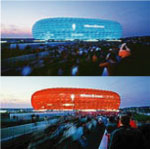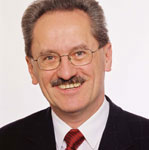
The Allianz Arena, home to Bayern Munich and TSV Munich, the city's two leading football clubs. The colour of the playing home team can be projected onto the exterior. (Photos: Allianz Arena)

FRONT PAGE
About us

The 2010 results
The 2010 project
The 2010 finalists
Code of Ethics
The World Mayor Prize

The 2008 results
The 2008 project
The 2008 finalists
The World Mayor Award

The 2006 results
Methodology
The 2006 finalists
The World Mayor Award

The 2005 results
Contest methodology
List of finalists
The World Mayor Award
Mayor Rama writes - Mayor Bakoyannis replies
Winners' comments

Mayor of Athens
Mayor of Guatemala City
Mayor of Mississauga
Mayor of San Fernando
Mayor of San Francisco

Mayor of Athens
Mayor of Guatemala City
Mayor of Mississauga
Mayor of San Fernando
Mayor of Vienna

Comments on finalists from The Americas
Comments on finalists from Europe
Comments on finalists from Asia, Australia and Africa
Comments on Addis Ababa
Comments on Antananariva
Comments on Athens
Comments on Atlanta
Comments on Belo Horizonte
Comments on Bonn
Comments on Guatemala City
Comments on Karachi
Comments on London
Comments on Melbourne
Comments on Mississauga
Comments on Rio de Janeiro
Comments on Rome
Comments on San Fernando
Comments on San Francisco
Comments on Toronto
Comments on Vancouver
Comments on Vienna

Mayor of Addis Ababa
Mayor of Antananarivo
Mayor of Athens
Mayor of Belo Horizonte
Mayor of Bonn
Mayor of Ekaterinburg
Mayor of Guatemala City
Mayor of Innsbruck
Mayor of Karachi
Mayor of Kiev
Mayor of Melbourne
Mayor of Mississauga
Mayor of Munich
Mayor of Rhodes
Mayor of Rome
Mayor of Tshwane
Mayor of Vienna

The 2004 contest
List of all 2004 finalists
Edi Rama wins 2004 award
People ask - Edi Rama replies
Why we voted for the Mayor of Tirana
Why we voted for the Mayor of Mexico City
History of Tirana

Front Page
Site Search
About City Mayors
Mayor Christian Ude:
Munich will invest one billion euro in 2005
In recent years the City of Munich, capital of Bavaria, has made tremendous progress with a number of major projects getting underway. The new Munich Airport, in joint ownership with the city, has turned into Germany’s leading turnstile for air traffic, second only to Frankfurt.
Comments
On the grounds of the former airport the new trade fair complex, Europe’s most advanced convention and congress centre was built by the city in cooperation with the Bavarian state. A new city quarter was developed south of the fairgrounds, which has received international awards for its ecological qualities. The new quarter is adjacent to a vast new landscape park where the Federal Horticultural Show, which attracts millions of visitors, is to be held this year. This event will be followed next year by the World Football Championships, to be held in the newly constructed soccer stadium Allianz Arena, in the north of the city.
By holding a referendum, city hall paved the way for this initiative by Munich’s two football clubs. In addition, Munich was awarded the new media centre for the World Championships, which will be installed in the new trade fair centre.
In the northern part of Munich, the urban planning department not only gave the green light for the architecturally bold football stadium, but also for the ensemble of high-rise buildings and the Gate to Munich which forms the archway to the city, as well as the architecturally spectacular BMW-World at the circular ring road, and the 146m tall building called Uptown Munich, the city’s highest building.
Despite financial problems, the City of Munich will invest again in 2005 in what will be by far the highest capital investments of all German cities - around one billion euro. Major investments include, apart from the extension of the subway network, the most extensive municipal programme ever of housing construction to meet the chronic housing shortage. The number of publicly financed housing units is as high as ever, but private building construction is inadequate due to a lack of financial incentives, although there is sufficient land for development and a great number of already approved building permits. New housing has gone up on the former fairgrounds and on sites formerly used by the military or railways.
Through its urban development policy and efforts to improve the infrastructure Munich city succeeded in becoming number one in foreign investments in the high-tech area, attracting many firms and businesses to the city. In Germany, Munich is the city with the highest growth potential, the best employment figures and the lowest unemployment rates.
In the ancient city centre and the traditional inner-city housing quarters, it is aimed to preserve Munich’s unmistakable residential character. With its renowned city skyline and the rich variety of its cultural spectrum, Munich holds third position in the tourist index (number of overnight stays per 100 inhabitants) among European capital cities, after London and Prague. But major municipal projects were implemented or tackled in the old city centre as well. Total urban renewal and the extension of the Art Nouveau theatre Schauspielhaus was the biggest municipal cultural investment in all of Germany. And on the historic Jakobsplatz, a Jewish Centre is under construction. This will include a synagogue, community centre, kindergarten and school, a restaurant with kosher food and a Jewish Museum. Thus Jewishness is being preserved in the former ‘Capital of the Movement’ with this new home base in the heart of the city.
For me, that was one of the most important projects of my term of office, which began in 1993.
In June I was elected President of the Deutschte Städtetag (Federation of German Cities). There I am devoting all my energy to strengthening municipal finances and the defence of local autonomy. In the preparatory stages of the federal elections, expected for September, I presented the key demands of the Federation of German Cities. This was addressed to the political parties by way of 10 election criteria, jointly with my predecessor and deputy in office and Mayoress of Frankfurt, Petra Roth. The principal issue concerns the struggle of the cities to preserve and modernise the main source of revenue, the business tax.
In the field of local autonomy it needs to be ensured that the City Works, which have come under private legal control during my term of office, can hold their ground in the face of competition on both the energy market and public transportation. As Chairman of the Supervisory Board I can say that so far this has worked out extremely well. We maintain that the water supply must remain in the hands of the city, since this has worked out exceptionally well for over a century, with the city providing optimal water quality at low cost. On municipal hospitals, a general restructuring was implemented last year to brace them for competition.
The conversion of around 14,000 municipal computers to Open-Source software, which was voted by the city council on my recommendation, has attracted international attention. This decision will lead to more competition on the software market. Some 10 years ago a general administrative reform of the municipality was initiated with the aim of improving customer orientation and achieving a higher degree of efficiency. Due to a variety of measures (the virtual city hall on the internet, new consulting services, improved opening hours) the overall satisfaction of citizens has improved tremendously, as opinion polls show.
Finally, the political climate is of the greatest importance for me.
Back in 1996 I founded a broad social Alliance against Radicalism of the Right and Violence, accepting patronage of the Christopher Street Day many years ago, and in 2003, in view of the war in Iraq, I called upon the people of Munich to join in demonstrations for peace in cooperation with churches and trade unions.

Christian Ude, Mayor of Munich
Introducing
Christian Ude
Born in Munich on 26 October 1947, the second child of the cultural editor Karl Ude and his wife, Renée.
Four years of elementary school at the Grundschule am Bayernplatz, Schwabing
Nine years 0skar-von-Miller-Gymnasium (grammar school).
1967 university-entrance diploma at the Oskar-von-Miller-Gymnasium.
1967 spokesman for the students‘ parliament of the Kreisjugendring (Munich regional youth association).
1967/68 regional chairman of the regional press association of school magazines in Bavaria.
1967–1969, trainee at first, afterwards member of the editorial staff of the Süddeutsche Zeitung newspaper, in charge of youth matters, school and university issues, as well as local government journalism.
Secondary studies of sociology and history.
1969, studies in law in Munich,
activities in the field of adult education.
1970, revival of the Münchner Post, a political magazine of the Munich SPD, editor until 1990.
From 1972 to 1978, party spokesman of the SPD München in an honorary capacity.
1977–1979, first and second legal state examination in Munich with honours, serving as junior barrister in various municipal offices.
1979– 1990 running own law office.
1980, foundation of the Stadtillustrierte, a political magazine published by the SPD group of the Munich City Council. Editor until 1990.
1983 married to Edith von Welser-Ude, SPD council member.
1986/87 chief editor of the Zeitung am Sonntag.
Since 1988 chairman of the Kulturforum der Sozialdemokratie in Munich.
Since 2001 honorary citizen of the isle of Mykonos.
Since 2004 visiting professor at the Nankai-University, Tianjing, China.
March 1990, elected as Member of the Munich City Council.
Since 2 May 1990, Deputy Mayor of the City of Munich, in charge of city works, social committees, culture policies, sports, personnel management, subway committee, legal matters and ward committees.
12 September 1993, elected as Lord Mayor of the City of Munich in the first ballot with 50.8% of the votes.
On 13 June 1999, re-elected as Lord Mayor of Munich with 61.2% of the votes and on 3 March 2002, re-elected as Lord Mayor of Munich with 64.5% of the votes.
Chairman of the committees of urban planning and building regulations, culture, labour and economic development, personnel management and organization and the urban design commission.
Chairman of the supervisory boards of
Stadtwerke München GmbH, (The Munich City Works).
GWG and Gewofag (municipal bodies of council housing),
Olympiapark München GmbH,
Munich Adult Education Centre and Federal Horticultural Show 2005.
Chairman of the supervisory board of the Munich Trade Fair authority, whose chair accepted for three years in rotation on 29 February 2004.
Chairman of committees of the Munich Transport Authority (MVV).
Chairman of the administrative council of the City Savings Bank.
Member of the supervisory board of the Munich Airport Company.
Since 12 July 1996, First Deputy Chairman of the Bavarian Towns Association.
Since 20 June 1996, Member of the Board and Member of the Executive Committee of the Association of German Mayors.
From 15 June 2003, Deputy President of the Federation of German Cities.
Since 2 June 2005, President of the Federation of German Cities.
Honours:
• 1988, First Munich City Award ‘Die Löwenpfote’ (‘The Lion’s Paw’)
for commitment against the practices of housing speculators and eviction of tenants.
• 1998, award of the Karl Valentin Order by the carnival organization Narhalla.
• Order of the Federal Republic of Germany (1998).
• 2000, ‘Hat of Socialists’ awarded by the SPD Lindau.
• ‘Capo Circeo Award’ by the German-Italian Association (2000).
• 2004, Order of the Free State of Bavaria.
Publications:
• Meine verfrühten Memoiren (1993) PIPER-Verlag.
• Chefsache (1999) PIPER-Verlag.
• Stadtradeln (2000) dtv.
• Ich baue ein Stadion und andere Heldensagen (2004) PIPER-Verlag.
• Picture book Open-Air Galerie. Farbige Botschaften an die Welt (jointly with Edith von Welser-Ude) publisher Frederking & Thaler.
• Picture book Menschen und Miezen. Vom Zauber, mit Katzen zu leben
(jointly with Edith von Welser-Ude) Kabel Verlag.
• Numerous publications in books on historic, cultural and political issues.
Editor of the following books:
• Münchner Perspektiven (1989) PIPER-Verlag.
• Wege aus der Wohnungsnot (1990) PIPER-Verlag.
• Münchner Projekte (1993) PIPER-Verlag.
